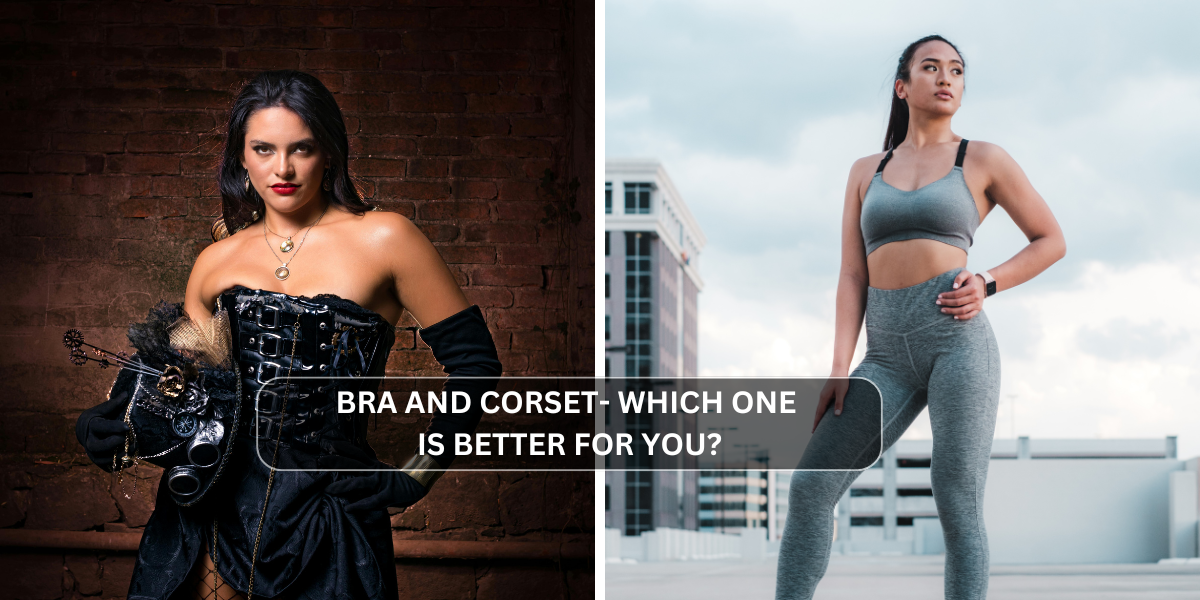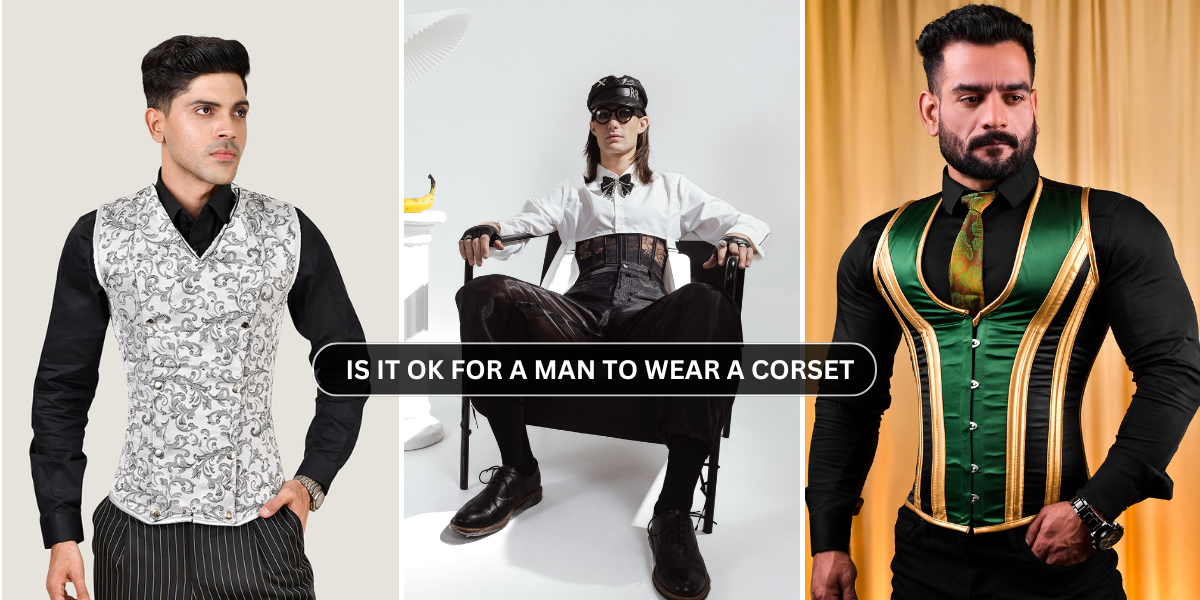Are Corsets Bad for Your Health? - Experts Advice

Corsets have been a fashionable choice for generations and remain a popular trend to this day.
Well, now people have been arguing about the pros and cons of corsets. Some individuals argue that corsets are good for health, whereas others believe that they have several benefits.
This has created a contentious discussion on the subject. Are Corsets Bad for Your Health?
In This article, we will dive into the benefits of wearing corsets and take a look at some of the so-called myths regarding their potential risks.
After reading this, you'll be convinced that corsets are a fantastic wardrobe addition.
What are The Benefits of Corsets?
Corsets can help you achieve a variety of fashion goals. They are great for creating a smooth, hourglass figure and enhancing your natural curves. Corsets can also provide support for your back and shoulders, helping to improve your posture. In addition, corsets can boost your confidence and self-esteem by making you feel more attractive and put-together.
But corsets are not just about aesthetics. They also have several health benefits. For example, corsets can help alleviate back pain by providing additional support to your spine. They can also reduce bloating and indigestion by compressing your stomach and intestines. In fact, some women wear corsets during pregnancy to help support their growing bellies and relieve back pain.
Benefits of corsets: Emotional, Social, and Physical Benefits
Corsets and Health: Debunking Common Myths
Despite the many benefits of corsets, there are several common myths about their potential risks. By understanding the truth about corsets, we can make informed decisions about wearing them.
Myth #1: Corsets Can Cause Organ Damage
At Miss Leather, we have heard this myth commonly about corsets that they can damage your body organs. The theory is that the pressure from the corset can cause your organs to shift or compress, leading to health problems. this theory is only fiction and not supported by any medical evidence. The human body is remarkably resilient, and the pressure from a corset is not strong enough to cause organ damage.
Myth #2: Corsets Can Cause Breathing Problems
Another common myth about corsets is that they can cause breathing problems. The theory is that the tightness of the corset can restrict your lungs and make it difficult to breathe. While a tightly-laced corset may feel uncomfortable at first, most people can breathe normally while wearing a corset.
However, our all corsets are highly adjustable and can fit according to your body type.
Myth #3: Corsets are Uncomfortable and Restrictive
Finally, some people believe that corsets are uncomfortable and restrictive. While it's true that corsets can take some time for getting used to, they are not inherently uncomfortable or restrictive. In fact, a well-made corset should fit snugly but not feel tight or constricting. And with modern materials and designs, corsets are more comfortable than ever before.
Myth #4: Corsets can permanently change your body shape
Another common myth about corsets is that wearing them can permanently change your body shape. This myth stems from the belief that corsets can mold the body into a certain shape by reshaping the bones and organs in the body. However, this is not true.
Although corsets may seem like the solution to achieving a smaller waistline, they are only able to create an illusion.
Your body's natural shape will remain unchanged, and the effects of the corset will disappear once it is removed.
What experts say about Corsets?
Now let’s talk about some experts:
Corsets: Separating Fact from Fiction
Corsets have a complex history that is associated with the oppression of women and the harmful effects of body modification.
Deirdre Clemente, an associate professor of history at the University of Nevada, sheds light on this issue, explaining that while corsets were not as torturous as claimed, they were still used to control women's bodies.
Further examination and understanding of this multifaceted history are needed to fully comprehend its impact on women's bodies.
Originally, corsets were a necessary garment for modesty, rather than a fashion statement. However, over time, they became associated with creating the illusion of a smaller waist, leading to the negative reputation they have today.
Body Distortion in Fashion
Clemente points out that all fashion involves some degree of "body distortion." While corsets are no exception, they have remained popular throughout modern fashion cycles, despite the rise of dieting. This suggests that their appeal goes beyond mere vanity and that they may serve as a form of self-expression and empowerment for some wearers.
The Risks of Wearing Corsets
Dr. Tasneem Bhatia warns that while wearing a corset for a short period of time may not be harmful, wearing one for an extended period can have serious consequences. Corsets can put pressure on the abdominal organs and bladder, as well as the pelvic floor muscles, which can lead to gynecological issues.
It's important to wear a corset that fits properly and allows for comfortable breathing, sitting, and standing. It's also crucial to limit wear to no more than four to six hours at one time.
Do’s and Don’ts of Wearing a Corset
The Do's of Wearing a Corset
- Make sure you purchase the right size corset for your body type.
- Wear a comfortable and breathable fabric like leather, cotton, or mesh.
- Gradually break in your corset by wearing it for short periods at first.
- Use a liner or shirt underneath your corset to prevent chafing.
- Adjust your posture to keep your back straight while wearing a corset.
- Take breaks from wearing your corset throughout the day to stretch and breathe.
The Don'ts of Wearing a Corset
- Don't wear a corset while sleeping or engaging in strenuous activities.
- Don't wear a corset if you have any medical conditions that may be worsened by the pressure.
- Don't wear a corset if you are pregnant or nursing.
- Don't wear a corset if you feel faint or dizzy.
- Don't wear a corset if you feel any pain or discomfort.
Corsets 101: A Beginner's Guide, Everything About Corsets
Types of Corsets: 18 types you need to know
Are you looking for a fun and stylish way to enhance your figure?
Wearing a corset can be just what you need!
But before you dive in, remember to wear them safely and responsibly. Listen to your body and avoid putting too much strain on it while wearing a corset.
And don't believe the myths that they're necessarily harmful to your health.
Final Words: Are Corsets Bad for Your Health?
The truth is, with proper fit and moderation, corsets can provide several benefits, such as improved posture and support for the back.
A well-fitted corset can provide relief from back pain, and help maintain proper alignment of the spine. Additionally, corsets can create a flattering hourglass figure, boosting confidence and self-esteem.
However, there are some potential health risks associated with wearing a corset for extended periods. Wearing a properly fitted corset can provide benefits, but it's important to avoid wearing one for extended periods of time. It is important to choose a properly fitting corset and to wear it in moderation to avoid any negative effects.





